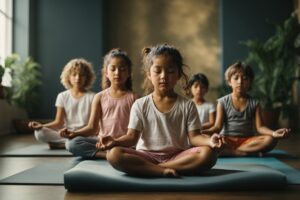The Joy of Yoga for Kids
 Yoga isn’t just for adults. It’s a practice that can significantly benefit children too. Yoga for kids is not just about imitating animal postures or sitting in quiet meditation. It’s a holistic approach that combines movement, breathing, and mindfulness in a way that speaks to the playful spirit of children. Through a series of fun and imaginative poses, kids learn to explore their bodies, discovering strength, flexibility, and balance. Simple yoga poses, such as the Tree Pose or Child’s Pose, can be both fun and beneficial, allowing kids to connect with their bodies and emotions in a playful manner.
Yoga isn’t just for adults. It’s a practice that can significantly benefit children too. Yoga for kids is not just about imitating animal postures or sitting in quiet meditation. It’s a holistic approach that combines movement, breathing, and mindfulness in a way that speaks to the playful spirit of children. Through a series of fun and imaginative poses, kids learn to explore their bodies, discovering strength, flexibility, and balance. Simple yoga poses, such as the Tree Pose or Child’s Pose, can be both fun and beneficial, allowing kids to connect with their bodies and emotions in a playful manner.
Yoga teaches children how to focus. Through yoga, kids learn to pay attention to their bodies, their breath, and the present moment. This newfound focus not only enhances their yoga practice but also translates into better concentration in school and improved cognitive abilities.
It teaches them patience, resilience, and the ability to cope with challenges. In the gentle stretches and relaxing breathing exercises, kids find a sanctuary where they can release stress and embrace tranquility.
Yoga for Teens
Teenagers often face the pressures of academics, social expectations, and self-discovery, leading to stress and anxiety. Yoga offering them a safe space to unwind and relax. Through a series of gentle postures and mindful breathing, teenagers learn to let go of tension, both in their bodies and their minds. Yoga becomes a powerful antidote to peer pressure, social expectations and self-doubt.
Yoga teaches teenagers to appreciate their bodies for what they can do, not just how they look. Through yoga, teens learn to celebrate their strengths and accept their limitations, fostering a positive body image and a sense of self-worth.
By learning to breathe through discomfort on the mat, teens gain the resilience to face challenges off the mat. Yoga becomes a safe space to explore their emotions, helping them manage stress, anxiety, and even anger.
Yoga teaches teens to be present and to focus on the present moment, whether it’s the stretch in a pose or the rhythm of their breath. This enhanced focus not only improves academic performance but also sharpens their decision-making skills, setting them on a path toward success.
Fun and Engaging Wellness Activities Beyond Yoga Mats
While yoga forms the core of holistic well-being, there are numerous other activities that can complement its benefits. Dance is a fantastic way for kids and teens to stay active while expressing themselves creatively. Enrolling in dance workshops, be it hip-hop, ballet, or contemporary dance, not only improves physical coordination and flexibility but also nurtures a sense of rhythm and self-confidence. Dancing it’s an exhilarating experience that allows young minds to explore different styles and cultures while keeping their bodies in great shape.
Martial arts such as karate, taekwondo, or judo are excellent options for kids and teens seeking a unique blend of physical activity and mental discipline. Besides enhancing self-defense skills, martial arts instill values like respect, focus, and perseverance. These practices empower young individuals, teaching them not only to protect themselves but also to approach challenges with a calm and composed mind.
Outdoor activities like hiking, rock climbing or kayaking provide the perfect combination of excitement and exercise. Exploring nature not only improves cardiovascular health but also fosters a deep appreciation for the environment. Activities such as rock climbing enhance physical strength and problem-solving abilities, making them ideal for teens looking for a thrilling challenge beyond the screen.
Engaging in creative arts and crafts activities it’s a fantastic way to relieve stress and enhance mental well-being. From painting and pottery to knitting and origami, the world of creative arts is vast and diverse. These activities promote focus, patience, and attention to detail, providing a calming effect on young minds. Crafting together in a group setting also encourages teamwork and social interaction, fostering valuable interpersonal skills.
Mindfulness workshops tailored for kids and teens offer valuable tools to navigate the challenges of growing up. Through activities like guided meditation, breathing exercises, and mindful journaling, young individuals learn to manage stress, improve concentration, and build emotional resilience. These workshops create a safe space where they can explore their thoughts and feelings, fostering self-awareness and a deeper understanding of themselves.
Parental Involvement
Parents play a vital role in encouraging their children to embrace yoga and wellness activities. When parents actively engage in these activities with their kids and teens, they send a powerful message. They demonstrate that health is a family affair, emphasizing the value of togetherness in achieving common goals. In these moments, families forge stronger connections, creating a supportive environment.
When parents exhibit a commitment to yoga and wellness practices, they serve as living examples for their kids and teens. It’s about embodying mindfulness, discipline, and self-care. By seeing their parents’ dedication to these practices, young individuals are more likely to embrace yoga and wellness activities as integral parts of their lives.
Parental involvement in these practices creates a safe space where kids and teens can openly discuss their feelings. Parents become not just caregivers but empathetic listeners, teaching their children essential emotional intelligence skills.
In the serene environment of a yoga session or a wellness activity, communication flows more freely. Parents and children engage in meaningful conversations, sharing experiences and aspirations. This open dialogue fosters mutual understanding and trust. It becomes a platform where teenagers, often navigating the complexities of adolescence, feel heard and valued. As parents actively listen to their teens’ concerns and victories, they bridge the generation gap, creating an atmosphere of respect and acceptance.
Parents must show the younger generation a lifestyle in which holistic health and yoga are not just an activity, but a way of life. Shared activities become cherished family traditions, encouraging consistency and commitment. As children grow into adulthood, the foundation of wellness laid in their formative years becomes an inherent part of their lifestyle, promoting longevity and a high quality of life.
